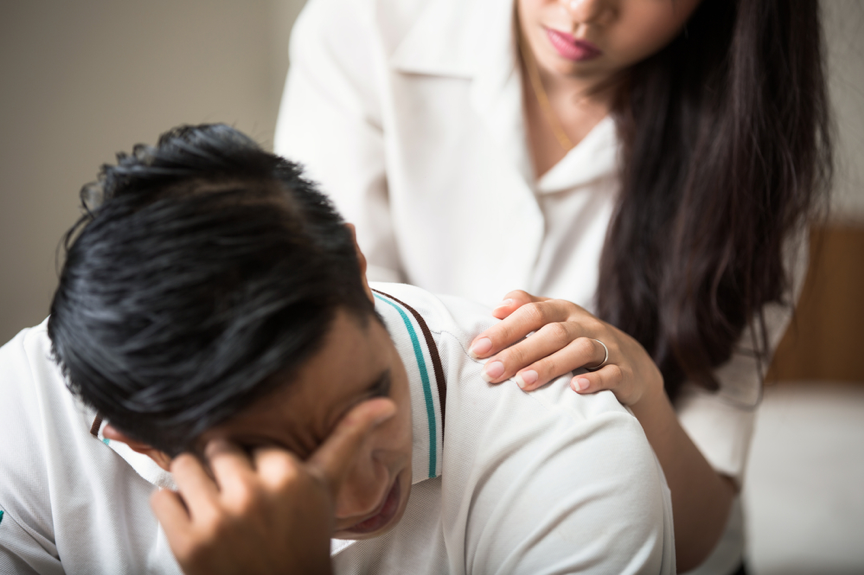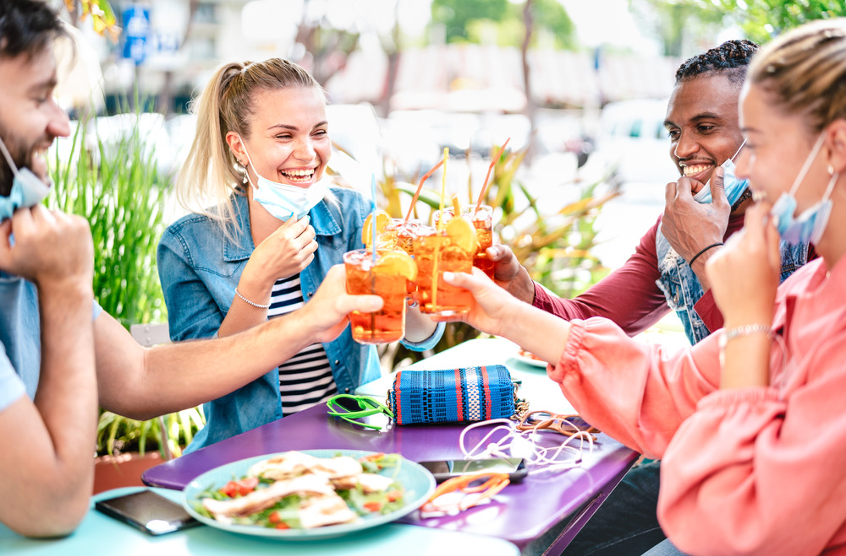7 Relationship Conversations for the Next COVID Challenges

So far, you’ve made it through quarantining together. Congratulations. Hopefully, you both have taken the time to acknowledge that you faced adversity together and you’re coming out on the other side. Being together at home for that amount of time and sharing your space is no easy feat and you should be proud of your relationship perseverance.
…but we’re not totally out of the relationship woods yet!
As different cities and states around the US are moving into Phase 3 (and more) of re-opening and the potential second wave of COVID-19 potentially looming, there’s likely a whole other level to navigate in your relationship.
Here are 7 conversations to have with your partner to get in front of the next coronavirus challenges and potential pitfalls. Consider these an opportunity to strengthen the good groundwork you laid when you first went into quarantine together.
These may be great dinner conversations and ways to navigate the “what’s next” in these unusual times.
1. Acknowledge the stress that you’ve both experienced
There are a number of stressors that may have come up during quarantine: the sense of loss of a job or a social life, financial strain, feeling constrained, differing political beliefs, managing children at home on top of work responsibilities, etc. The list could go on and on.
Take stock of the recent time that you have been together and discuss how to better move through the tough times. Discuss what worked, what didn’t work, and what could have been better. Meet this conversation with great kindness and compassion for yourself and each other. Apologies may be in order.
Give each other space for whatever the other is feeling and validate each other’s feelings. Deeply listen to what they have to say.
Open and honest communication is healthy for lasting relationships. But getting through some of those conflicts takes empathy, trust, and most of all kindness to each other.
2. Navigate your fears and concerns
In addition to acknowledging the stress, it could also be a good exercise to individually list your fears and concerns and then come together and discuss them. Again, this conversation takes empathy, trust, and kindness. So set some ground rules about how to care for each other before you begin. Listen deeply and be sure to acknowledge each other’s thoughts and feelings, and validate each other’s fears and concerns. Some examples may be:
- Fear of the virus itself
- Uncertainty about the future
- You want to wear a mask and your partner doesn’t in public
- Your city is opening – you want to get out there and your partner says they are not ready to go out
- You really miss your parents and want to see them
- Concerns about traveling
3. Evaluate how you’re both coping
Research studies clearly indicate that one of our basic coping mechanisms is the biological need for physical and emotional connection. That basic need doesn’t go away when we can’t get it if your partner isn’t into the hugs and cuddles in general, then an opportunity to bridge that gap between the two of you may be possible.
In short, do you find that you are hungry for physical connection? Can you get it from the people that you are living with? Be sure to express what you would like to have happen. Maybe your partner is unaware (or needs to be reminded) of your need for physical connection.
Another area to understand is to recognize what your styles are. Are you or your partner naturally an introvert? If so, one of you may really have enjoyed the time in isolation and less exposure to people. However, if one or both of you are an extrovert, then the time in quarantine may have taken its toll on you and your relationship.
There are creative ways to get these needs met and discuss what works for you both.
I know many people have engaged technology for social time. Some ways of addressing getting social needs met are Facetime family calls, Google Hangout Happy Hours, and Zoom dinner parties with another couple.
Another way to evaluate how you are coping is to make sure you check in with each other for at least 10 minutes a day. Ask your partner open-ended questions like:
- “I know things are tough right now, is there anything I can do to make it easier?”
- “What’s your day been like?”
- “Tell me more about what’s going on”
- “What do you need right now?”
- “What don’t you need right now?”
- “How is that for you?”
4. Start with “Thank you!”
It’s important to acknowledge the positive aspects of your relationship, especially in light of the challenging times that we are in.
Were there any moments that you were particularly grateful for in the past months where your partner helped you get over an emotional or financial hurdle? Did they do anything, in particular, to help share the stress, balance the responsibilities at home, give you the space you needed, etc?
Expressing gratitude for your partner regularly, particularly now after going through (literally) a global challenge together, is one way to deepen your loving relationship.
It would not be uncommon that during the first few months of quarantine, you were faced with feelings of depression and anxiety. Being present to the good things in your life can help counteract the downward spiral that is common when we focus on our negative feelings.
However, when we focus on the things we are grateful for, the positive feelings and experiences that we have shared with our partner, it can dramatically help to improve our outlook and lighten the mood.
Not feeling it?
Maybe there were too many bumps in the road during early quarantine that you just can’t find the things to feel thankful for. Lack of felt and expressed gratitude is one of the main reasons I’ve seen relationships falter and often fail because one or both partners took the other for granted.
At the very least, hopefully, you made it through quarantine together and you learned a lot about each other. That’s at least one thing that you can share that you’re grateful for.
Expressing gratitude without expectation is always a good idea. So if you are going to share the things with your partner that you’re grateful for, do it in a way that they can best receive it. Consider your partner’s love language or simply ask, “What is the best way I can express my love and gratitude for you?”
If you can offer your thankfulness in a special way, bonus points for you. It doesn’t have to be a production, but unexpressed gratitude doesn’t do anybody any good. Maybe you can express it in a love note, do something unexpected, or buy a thoughtful gift. The most important thing is that we feel and express gratitude for our partner’s presence in our lives.
5. Foster kindness
Of course, if you’ve gotten this far, you’ve likely had one or more opportunities to maneuver through issues of territoriality and see how you and your partner deal with stress. Did you learn who had the most patience or the shorter fuse? Did this quarantine experience bring you closer together or do you feel more withdrawn from each other?
Kindness may seem like a simple thing to do, but under stressful situations, it may be the hardest thing to offer in your relationship. To create enduring and mature love, it’s important to learn the ways of thinking and behaving together that teach us how to receive and express love to each other.
Kindness is one of the most powerful and strongest foundations of love and intimacy. Sometimes a simple touch or word of comfort can be just enough to help someone begin to get through a troubling moment in time.
6. Nurture self-care
Being in quarantine is a lot of together time. Were you able to carve out some “me time”?
Make sure in your conversations with your partner that both of you are able to build in time for self-care. Whatever that looks like now as things are starting to open up and hopefully some places like spas and salons are operating safely. Creating this time is particularly important if children are involved or looking after aging parents.
At the very least, schedule each day to maintain your sanity. Every little bit of alone time counts including quiet for meditation, a walk around the block or an isolated corner to read for 20 minutes.
Make sure that both you and your partner take care of yourselves in this way. Be sure to inquire about what your partner needs and how you can support them as well.
7. Moving forward in your relationship and community
Have you both discussed how you would like to move forward in your relationship and community?
Are you both comfortable in the following scenarios?
- Going out to eat with friends or family?
- Going to a bar or nightclub together or alone with friends?
- Going on summer vacation – what does that look like now?
- Wearing masks or not during driveway gatherings/block parties?
- What about traveling to see family?
- What about going back to work?
- How will going back to work happen if you have children?
It’s wise to get everything on the table to discuss where your boundaries are and what works/doesn’t work for you both.
Additionally, we’ve all been isolated and I know in my community, it’s been a great gift to start to see more people out and about together.
If you don’t know your neighbors, take a walk up and down your street. This can be a big one in terms of reducing the sense of isolation. We’ve all been living separate lives. But now’s your chance to help create a sense of community.
If you are choosing not to start meeting with friends or family in large groups, another way you can start to branch out is re-establish connections with people that you would usually socialize. Schedule one to two Zoom or Facetime calls a week with people you would like to reconnect with.
Looking forward to more freedom!
So many clients, friends, and family members have asked for my guidance about what to look forward to. What I recommend is to make a few lists of things you’d like to experience when we are freer.
It may help to break things up into distinct periods. Where would you like to be in 3 months, six months, a year, or five years? Having things to look forward to can help us endure the deprivation we’ve experienced since we’ve been sheltering in place.
You might also want to have two separate lists for each of you to include things you want to do as individuals and as a couple.
It is important to keep up our hopes, wishes, dreams, and desires in our minds when we are confined. You can also help each other as you create your lists.
If one or both of you are finding all of this to be a challenge, that’s quite ok. Many couples are struggling with these issues right now. Try reaching out to friends and family for support. In addition, you always have the option to reach out to a counselor in the area. Many are now doing telehealth via phone or online video sessions.
I hope that this article was helpful. Please feel free and encouraged to contact me if I can be of any assistance. I would be more than happy to offer you a free 15-minute phone consultation to see if I am a good fit for what you are looking for.






















Tips For Dealing With Covid During the Holidays | Gary Brown
[…] and especially more difficult now with COVID-19. As a result of this virus, there will likely be more conversations to have than asking about, “What’s on your Christmas list this […]
New Year's Resolutions and Goals: What’s the Difference & Secrets to Make Them Actually Work
[…] as this year turns, it always gets me thinking about how I want to make this year different and the great list of things that I want to do once COVID-19 is under control […]